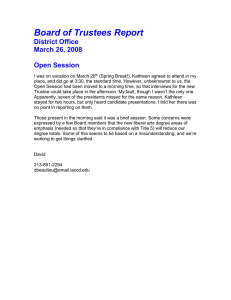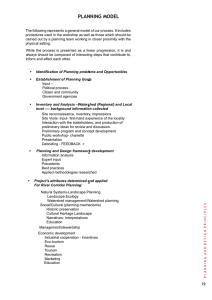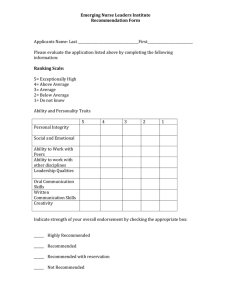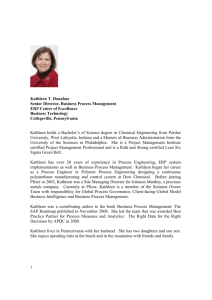Meeting 1
advertisement
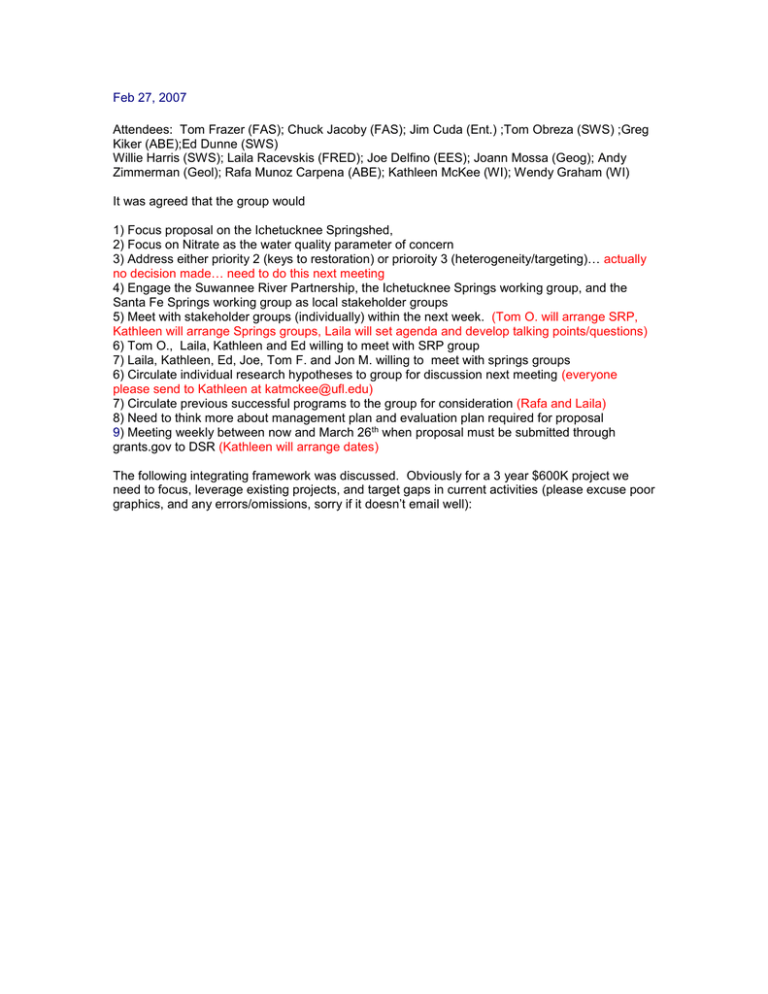
Feb 27, 2007 Attendees: Tom Frazer (FAS); Chuck Jacoby (FAS); Jim Cuda (Ent.) ;Tom Obreza (SWS) ;Greg Kiker (ABE);Ed Dunne (SWS) Willie Harris (SWS); Laila Racevskis (FRED); Joe Delfino (EES); Joann Mossa (Geog); Andy Zimmerman (Geol); Rafa Munoz Carpena (ABE); Kathleen McKee (WI); Wendy Graham (WI) It was agreed that the group would 1) Focus proposal on the Ichetucknee Springshed, 2) Focus on Nitrate as the water quality parameter of concern 3) Address either priority 2 (keys to restoration) or prioroity 3 (heterogeneity/targeting)… actually no decision made… need to do this next meeting 4) Engage the Suwannee River Partnership, the Ichetucknee Springs working group, and the Santa Fe Springs working group as local stakeholder groups 5) Meet with stakeholder groups (individually) within the next week. (Tom O. will arrange SRP, Kathleen will arrange Springs groups, Laila will set agenda and develop talking points/questions) 6) Tom O., Laila, Kathleen and Ed willing to meet with SRP group 7) Laila, Kathleen, Ed, Joe, Tom F. and Jon M. willing to meet with springs groups 6) Circulate individual research hypotheses to group for discussion next meeting (everyone please send to Kathleen at katmckee@ufl.edu) 7) Circulate previous successful programs to the group for consideration (Rafa and Laila) 8) Need to think more about management plan and evaluation plan required for proposal 9) Meeting weekly between now and March 26th when proposal must be submitted through grants.gov to DSR (Kathleen will arrange dates) The following integrating framework was discussed. Obviously for a 3 year $600K project we need to focus, leverage existing projects, and target gaps in current activities (please excuse poor graphics, and any errors/omissions, sorry if it doesn’t email well): Human preference, values, attitudes Human behavior (Land use & management) (Laila, Kathleen) (Tom O., Ed , Rao) N losses from land use practices (fertilizer, septic tanks, wastewater effluent , urban/suburban runoff) (Rafa, Greg, Willie, Rao, Jasmeet, Keith) Transport and transformation of N in groundwater s & surface water (Andy, Liz, Jon M., Rafa, Matt, Joe, Joanne, Kirk) New knowle Education (formal and informal , Incentives, Contraints (Chuck, Jim , Tom O., Ed, Mark, Laila, Greg) Thanks for participating… Stay tuned for developments. Wendy Graham -----Original Message----From: Water Institute Expertise Faculty [mailto:WATERINSTITUTE-EXPL@LISTS.UFL.EDU] On Behalf Of Mckee,Kathleen A Sent: Tuesday, February 20, 2007 10:04 PM To: WATERINSTITUTE-EXP-L@LISTS.UFL.EDU Subject: USDA/CSREES RFP Santa Fe Watershed Dear Water Institute Affiliated Faculty Tuesday Feb 27 from 3:30 to 5 we will be meeting to coordinate a group that will develop research, extension, education ideas for the USDA RFP included below, leveraging data and work developed in the Ichetucknee springshed / Santa Fe basin. We hope to leverage work being done on the funded Santa Fe basin Hydrologic Observatory Testbed http://suwanneeho.ifas.ufl.edu/ as well expertise in the Ichetucknee Springs working group, SRWMD, FDACS, IFAS extension and FDEP. USDA/CSREES National Integrated Water Quality Program Grant (Everyone!! http://www.grants.gov/search/search.do?mode=VIEW&oppId=12127 3. Integrated Research, Education, and Extension Projects Program Area 110.D All proposed projects in Program Area 110.D MUST present a FULLY integrated research, education, and extension approach to solve water resource problems at the whole watershed scale that include linked research objectives, education objectives, and extension/outreach objectives. Projects submitted to Section 110.D will be evaluated, in part, based upon the degree to which they address the following items. Projects responding to this section of the RFA MUST: * Identify the cause of water resource degradation; * Solve water resource problems at the whole watershed scale. Applications that propose work at a spatial scale other than the whole watershed must demonstrate that the geospatial scale or entity (state, county, or community) is the most appropriate scale of investigation and will ultimately result in watershed level improvements in water resources. Projects at the plot- or field-scale will not be accepted; * Include hypothesis-driven research that fills the knowledge gaps that are critical to the development of practices and programs that will improve the quality of the Nation's water resources; * Create educational deliverables (e.g., interdisciplinary curriculums, experiential learning for undergraduates and graduate students) that will train the next generation of scientists and educators who will work to improve the Nation's water resources; * Deliver an effective extension/outreach program that will lead to measurable behavior change in an identified audience or stakeholder group; * Include a management plan (developed with input from stakeholder advisory groups, watershed councils, or other community led action teams) that leads to measurable improvements in the watershed condition; and * Develop and implement an evaluation plan that demonstrates the impact of the project through measured improvements in water quality and/or measurable behavior change. If you are interested and/or have research / extension / education interests in this basin, please let us know and if you are able to join this meeting. The proposal is due April 4th. Thank you, Kathleen McKee UF Water Institute http://waterinstitute.ufl.edu 570 Weil Hall PO Box 116601 Gainesville, FL 32611-6601 ph 352-392-5893
